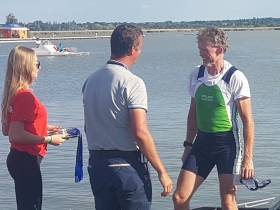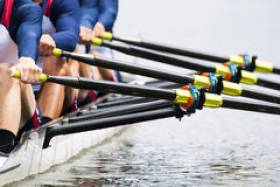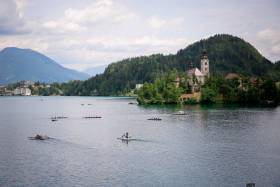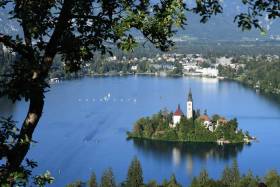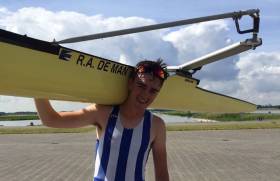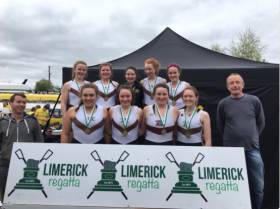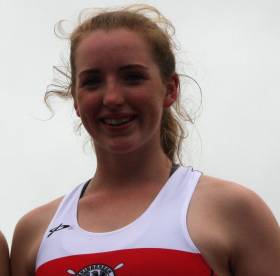Displaying items by tag: Clonmel
Crowley Leads Ireland to More Masters Wins in Hungary
#Rowing: Irish crews added four more wins to their haul over the weekend at the World Masters Regatta at Lake Velence in Hungary. The wins came on Saturday. Denis Crowley featured in a composite eight, which beat strong British opposition, and in a four – bringing his personal tally to eight wins. Brendan Smyth and Patrick Fowler of Commercial won in the double and Milo and Pat Murray of Cappoquin won the in the pair. A mixed eight finished second on Sunday.
World Masters Regatta, Lake Velence, Hungary (Selected Results; Irish interest; Winners)
Saturday
Men
Eight (E – avg 55 or more): Galway, Belfast BC, Neptune, Clonmel, Commercial, Shannon (G Murphy, A McCallion, K McDonald, D Crowley, F O’Toole, O McGrath, G O’Neill, C Hunter, M McGlynn) 3:04.90
Four (D – avg 50 or more): Commercial, Neptune (B Smyth, F O’Toole, G Murphy, D Crowley) 3:24.72.
Pair (F – avg 60 or more): Cappoquin (P Murray, M Murray) 6:12.10.
Sculling, Double (C – avg 43 or more): Commercial (B Smyth, F Fowler) 3:28.39.
Crowley a Six Shooter at World Masters Regatta
#Rowing: Denis Crowley of Commercial brought his tally of wins to a remarkable six after three days at the World Masters Regatta in Budapest. In just one day, the 57-year-old won in the coxless four and twice in the single sculls – in the C class (43 years or more) and the E class for 55 or more. The decision to form composite crews again paid off for the Irish, with wins in the C eight and the D coxed four, along with Crowley’s haul.
World Masters Regatta, Budapest, (Selected Results, Irish interest, winners)
Friday
Men
Eight
(C – 43 or more): Heat Four: Commercial, Cork, Neptune, Clonmel, Shannon, Galway, Castleconnell (B Crean, B Smyth, R Carroll, O McGrath, G O’Neill, P Fowler, B O’Shaughnessy, K McDonald; cox: M McGlynn) 3:09.75.
Four
(E – 55 or more) Heat Five: Commercial, Neptune, Belfast BC, Galway (D Crowley, G Murphy, C Hunter, A McCallion)
Four, coxed
(D – 50 or more) Heat 3: Galway, Neptune, Castleconnell, Clonmel (G O’Neill, O McGrath, B O’Shaughnessy, T Dunn; cox: M McGlynn) 3:35.89.
Sculling, Single
(C - 43 or more) Heat 19: Commercial (D Crowley) 3:49.92.
(E – 55 or more) Heat 8: Commercial (Crowley)
Irish Composite Crews Lead the Way at World Masters
#Rowing: A composite of five crews – Galway, Neptune, Commercial, Clonmel and Cork – won in the men’s eight for 50 and over at the World Masters Regatta in Budapest. It was one of a sequence of wins for the Irish at the huge event.
Brendan Smyth and Patrick Fowler, rowing for Commercial, won the Pair in the A class, while Denis Crowley and Tony Corcoran won in single sculls.
Two C fours (43 or more) won and an E coxed four (55 or more) also took the honours.
World Masters Regatta, Budapest, (Selected Results, Irish interest, winners)
Wednesday
Men
Four, coxed E (55 or more) – Heat Four: 1 Belfast BC, Commercial, Galway, Leichhardt RC (C Hunter, A McCallion, M Heavey, G Canning; cox: JM Marks) 8:05.40
Thursday
Men
Eight (D – 50 or more) – Heat Two: Galway, Neptune, Commercial, Clonmel, Cork (B Crean, B Smyth, R Caroll, O McGrath, G O’Neill, P Fowler, D Crowley, G Murphy; cox: M McGlynn) 3:05.06.
Four (C – 43 or more): Heat Three: Commercial, Galway, Clonmel, Neptune (R Carroll, O McGrath, P Fowler, G O’Neill) 3:15.28. Heat Six: Commercial/Neptune (D Smyth, F O’Toole, G Murphy, D Crowley) 3:15.54.
Pair (A – 27 or more): Heat Three: Commercial (P Fowler, B Smyth) 3:32.68
Sculling, Single – (D – 50 or more) – Heat 15: Commercial (D Crowley) 3:55.15.
(H – 70 or more) – Heat Eight: 1 T Corcoran 4:27.08.
Four and Pair add to Irish Tally at World Masters
#Rowing: The C coxed four of Rob Forde, Patrick Fowler, Oisin McGrath, Gary O’Neill and Tony Corcoran won their heat. The Commercial, Clonmel and Neptune crew beat a Monmouth crew from Britain by almost two seconds.
Milo and Patrick Murray from Cappoquin brought Ireland’s win tally on the day to three when they won in the F Pair.
Earlier an Irish composite eight had won in the E class.
World Masters Regatta, Bled, Slovenia, Day Four (Selected Results; Irish interest; all heats of 1,000 metres, winners only)
Men
Eight ‘E’ (Avg 55 or more) – Heat Three: Waterford, Neptune, Commercial, Belfast BC (A Penkert, J Hudson, D Crowley, G Murphy, M Heavey, C Dickson, C Hunter, F O’Toole, D McGuinness) 3:07.88.
Four, coxed ‘C’ (Avg 43 or more) – Heat Four: Commercial, Clonmel, Neptune (T Corcoran, R Forde, P Fowler, O McGrath, G O’Neill) 3:19.51.
Pair ‘F’ (Avg 60 or more) – Heat Five: Cappoquin (P Murray, M Murray) 3:46.64.
Irish Crews Win at World Masters Regatta
#Rowing: Irish composite crews had good wins on the first day of the World Masters Regatta in Bled in Slovenia. The Irish B eight (average age 36 or more), which is formed from six clubs won. Two fours in the E class (average age 55 or more) also won – the Galway/Neptune combination by just .26 of a second. The decision was initially given to their German opponents.
World Masters Regatta, Bled, Slovenia, Day One (Selected Results; Irish interest; all heats of 1,000 metres, winners only)
Men
Eight, B (avg 36 or more) – Heat Five: Galway, Commercial, Shandon, Clonmel, Neptune, Cork 3:05.51.
Four, E (avg 55 or more) – Heat One: Galway, Neptune 3:26.26.
Heat Four: Waterford, Neptune, Commercial, Belfast BC 3:28.1
Clonmel Pipped in Cracking Finish at Henley Royal Regatta
#Rowing: Clonmel were beaten in a phenomenally close race at Henley Royal Regatta today. In the second round of the Fawley Cup, Tideway Scullers’ took the lead early and had a length over the the four young men in the Clonmel junior quadruple. But Clonmel clawed their way back. The crews seemed to be on level terms as they came to the line, but Tideway Scullers’ got the verdict by four feet.
Henley Royal Regatta, Day Two (Irish interest)
Diamond Sculls (Open Single Sculls): J Stimpson bt N Kenny 3¼ l.
Temple Cup (College Eights): University of California, Berkeley bt Trinity 2½ l.
Wyfold (Club Fours): Commercial bt Curlew by 4¼ l .
Fawley (Under-18 Quadruple Sculls): Tideway Scullers’ School beat Clonmel by 4 ft.
Great Start for Clonmel Junior Scullers at Henley
#Rowing: Clonmel rowed well to overcome a slow start and win in the first round at Henley Royal Regatta today. The crew of Dylan Barry O’Donovan, Andrew Butler, Seán O’Donnell and Matt Dundon beat American crew Malvern Preparatory School B by two and a half lengths.
Henley Royal Regatta, Day One (Irish interest)
Prince Albert (College Coxed Fours): Deerfield Academy (United States) bt Trinity by 5ft; 6:59.
Fawley (Under-18 Boys’ Quadruples): Clonmel bt Malvern Preparatory School B, United States 2 ½ l.
Cork Boat Club and Clonmel's Lynch Excel at Limerick
#Rowing: Cork Boat Club had a good day at Limerick Regatta at O’Brien’s Bridge today. They won the the men’s intermediate eight and senior pair and the women’s junior 18 eight. UCD won the women’s novice eight and Daire Lynch of Clonmel, who won the single sculls time trial in a very fast time (five minutes and nine seconds), went on to take the senior and intermediate singles titles.
Limerick Regatta, O’Brien’s Bridge (Selected Results)
Men
Eight – Intermediate: Cork. Club: Neptune. Jun 18: Neptune. Masters – Final One (b-c): St Michael’s A. Final Two (d-e): Athlone. Jun 16: Col Iognaid.
Four – Sen: St Michael’s. Inter, coxed: Cork. Jun 18A, coxed: St Michael’s.
Pair – Senior: Cork. Jun 18: Clonmel.
Sculling
Quad – Sen: Carlow. Nov, coxed: UCC. Jun 18A: Carlow. Jun 16, coxed: CRCC.
Double – Inter: Castleconnell B.
Single – Senior: Clonmel (D Lynch). Inter: Clonmel (D Lynch). Jun 18A: Clonmel (A Butler). Jun 16: Castleconnell (R O’Neill). Masters – Final One: Lady Elizabeth (B Smyth). Final Two: Cork (B Crean). Final Three: Galway (A McCallion).
Women
Eight – Nov: UCD. Jun 18: Cork. Jun 16: St Michael’s.
Four – Sen: Shannon. Inter, coxed: Shannon. Jun 18: Col Iognaid.
Pair – Sen: Fermoy. Jun 18: Fermoy.
Sculling
Quadruple Novice, coxed: Cappoquin. Jun 18: Cork. Jun 16, coxed: Killorglin. Masters, coxed: Univ of Limerick
Double – Inter: Carlow.
Single – Inter: Garda (B Larsen). Jun 18A: Carlow (C Nolan). Jun 16: Cork (C O’Sullivan). Masters: Offaly (C Nolan).
#Rowing: Skibbereen took two of the three senior titles on offer in the evening session of the second day of the Irish Rowing Championships at the National Rowing Centre. The women's pair of Denise Walsh and Aoife Casey beat UCC, while the men's quadruple held off a late charge by a Queen's/Portadown composite.
Monika Dukarska of Killorglin won the women's senior single. She was dominant all the way, with only Siobhan McCrohan of Tribesmen testing her to any degree.
The junior women's eight gave Cork Boat Club a chance to impress. They led for most of the race, and while Bann held an overlap through the middle of the course, Cork were clear winners.
Trinity were extraordinarily dominant in the men's novice eight - their win by 11 seconds was cheered lustily by their fans.
Shandon fought through the opposition offered by Carlow to win the junior men's quadruple, and Roisin Maguire of Queen's was the best club single sculler.
The man of the day was, arguably, the Clonmel competitor Daire Lynch. The teenager added the men's intermediate single scull to the club title he had won earlier in the day. He passed Declan O'Connor of St Michael's in the middle stages of the race and won well.
Irish Rowing Championships, National Rowing Centre, Cork
Day Two (Selected results)
Men
Eight - Intermediate: Commercial 5:43.182. Novice: Trinity 6:00.157.
Four - Junior, coxed: 1 Cork A 6:29.20, 2 Portora 6:35.341, 3 Clonmel 6:40.716.
Pair - Senior: 1 Skibbereen 6:30.311, 2 UCD 6:33.546, 3 Portora 6:44.968.
Sculling, Quadruple - Senior: 1 Skibbereen 5:59.102, 2 Queen's/Portadown 5:59.790, 3 Shandon A 6:08.509. Junior: 1 Shandon 6:07.970, 2 Carlow B 6:13.361, 3 Three Castles 6:13.799.
Single - Inter: Clonmel (D Lynch) 7:04.573. Club: Clonmel (D Lynch) 7:15.463.
Women
Eight - Novice: Trinity 7:09.594. Junior: 1 Cork 1 Cork 6:39.271, 2 Bann 6:44.193, 3 Portora 6:49.287.
Pair - Senior: 1 Skibbereen 7:23.775, 2 UCC 7:29.369, 3 Trinity 7:46.166.
Sculling, Double - Inter: Lee 7:22.252.
Single - Senior: 1 Killorglin (M Dukarska) 7:35.069, 2 Tribesmen (S McCrohan) 7:50.320, 3 Skibbereen (O Hayes) 7:57.742. Club: Queen's (R Maguire) 8:15.155. Junior: 1 Skibbereen (E Hegarty) 8:05.674, 2 Neptune (C Feerick) 8:13.065, 3 Castleconnell (J Vascotto) 8:15.002.
Cork Four Beat Portora at Irish Rowing Championships
#Rowing: Cork Boat Club won the men's junior 18 coxed four at the National Rowing Championships today. On Friday, Portora had beaten Cork in the junior eight by leading all the way, but Cork turned the tables - they took the lead early and won by over six seconds. Daire Lynch, who won the junior single on the first day, added the club title with an emphatic win.
Emily Hegarty took the junior women's single by a huge margin, and her Skibbereen clubmates, Mark O'Donovan and Shane O'Driscoll, augmented the club's growing honour list by taking the men's senior pair. Their main rivals, UCD's Shane Mulvaney and David O'Malley, were over three seconds behind at the finish.
Commercial had a stirring win in the men's intermediate eight. UCD led to half way, just holding off Commercial, and it looked like there might be a battle between the two crews from there. But Commercial, stroked by Neil Gahan, moved away and won well in an excellent time.
In the women's novice eight Trinity won well, and Lee were commanding in their victory in the women's intermediate double.
Irish Rowing Championships, National Rowing Centre, Cork
Day Two (Selected results)
Men
Eight - Intermediate: Commercial 5:43.182.
Four - Junior, coxed: 1 Cork A 6:29.20, 2 Portora 6:35.341, 3 Clonmel 6:40.716.
Pair - Senior: 1 Skibbereen 6:30.311, 2 UCD 6:33.546, 3 Portora 6:44.968.
Sculling
Single - Club: Clonmel (D Lynch) 7:15.463.
Women
Eight - Novice: Trinity 7:09.594.
Sculling, Double - Inter: Lee 7:22.252.
Single - Junior: 1 Skibbereen (E Hegarty) 8:05.674, 2 Neptune (C Feerick) 8:13.065, 3 Castleconnell (J Vascotto) 8:15.002.


























